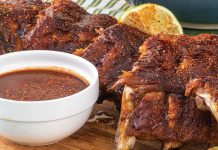Although camping is often associated with summertime, the reality is that camping is possible — and enjoyable — at almost any time of year. So if you’re planning ahead for an autumnal camping trip, you might already have given some thought to your travel plans and the equipment you’ll need. But if you have certain dietary restrictions or you’ll be braving the wilderness with vegan companions, you might need to do some extra preparation. Since studies show that people who replace meat with plant-based foods have a 20% lower mortality rate than those who consume meat, that additional prep work might be well worth it. And contrary to popular belief, you won’t have to miss out on all the fun if you’re camping while vegan (yes, there are vegan marshmallows on the market so you can get your s’more on). However, you will have to make some adjustments to your routine.
If hotdogs and jerkey aren’t on the menu, what do you when camping while vegan? Here are some insider tips that will allow you to partake in an animal-product-free excursion that everyone will enjoy.
Develop a Meal Plan
Whether you’re vegan or not, it’s a good idea to plan out exactly what you’ll be eating during your camping trip. Make sure you’ve got your breakfasts, lunches, dinners, and desserts covered. You can certainly bring pre-packaged items, but it’s often a lot more fun to make it yourself. After all, 78% of campers participate in outdoor cooking while camping! If you do plan to cook during your trip, you’ll want your meals to be filling and packed with ingredients that will keep you going. It’s also a bonus, particularly if you’re camping with non-vegans, if you can really impress the others with your skills. If they like your recipes enough, they’ll probably forget there isn’t any meat, dairy, or other animal products included — and since items like tender cuts of steak (which make up less than 10% of the beef) cost more, you might even convince your friends to go meatless themselves. Try out some recipes for oatmeal, eggless breakfast scrambles, campfire popcorn, vegetable soups and chilis, or grilled sweet potatoes to tantalize everyone’s tastebuds.
Pack the Vegan Staples
Although 97% of the Earth’s water is saltwater, the filtered water you’ll bring on your trip will be suitable for vegans and non-vegans alike. But what about when you get those mid-day hunger pangs? In addition to items you’ll cook right at camp, you’ll also want to bring along some homemade or pre-packaged snacks to make sure you’re satiated during a hike or after a swim. Trail mix, fresh or dried fruits and veggies, bread or tortillas, vegan granola bars or chips, hummus, dark chocolate, and dairy-free cheese can make your tummy stop rumbling until it’s mealtime. If you’re buying pre-packaged items, make sure to double-check the ingredients for any non-vegan culprits before you buy!
Borrow Instead of Buy
A lot of people embrace a vegan diet for animal rights reasons alone, but others are making the switch due to a desire to promote environmental responsibility. Sustainable practices can be a bit of a challenge in today’s convenience-driven world, but eco-friendly camping is definitely possible. If you need new gear, see what you might be able to borrow fist. Not only will this save you quite a bit of money, but it can keep your overall product consumption down — particularly if you don’t go camping often. Of course, you may want to invest in a vegan sleeping bag, which will keep you warm even without real down. But anything you can borrow or thrift for cheap (which will give new life to an unwanted item) is definitely a plus.
Bring Vegan Substitutes
Ultimately, it’s not just about the food. Wilderness protection items like insect repellent and sunscreen are essential when camping out, but the leading brands aren’t necessarily environmentally responsible — nor do they always contain vegan ingredients. Read the label to ensure that your sunscreen is cruelty-free so that you can prevent skin damage while preserving animal lives. You might also want to use a vegan bug spray (which you can make at home or purchase from natural brands). Plant-based hand sanitizers are also a good idea when you’re roughing it.
Some people might see a vegan lifestyle as a downer, but the substitutions are relatively easy to make as long as you think ahead. With these tips in mind, you can get back to nature without harming it further.




